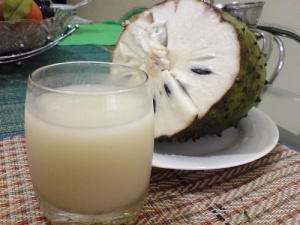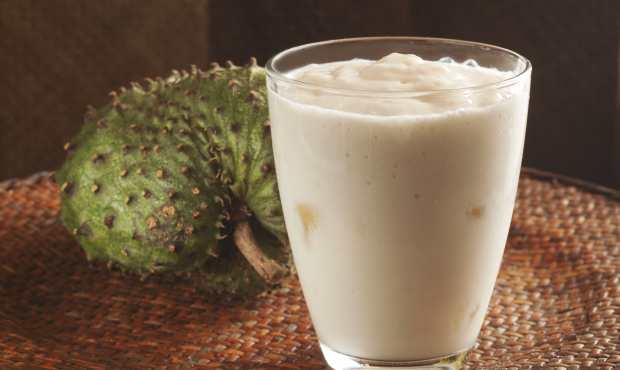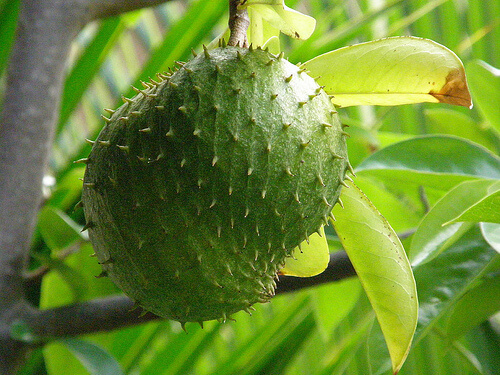What is Custard Apple or Soursop Fruit Used For?


Written and verified by the doctor Mario Benedetti Arzuza
Also known as graviola, custard apple or soursop is a native perennial fruit that’s native to Mexico, the Caribbean, and Central and South America. It originated in Peru and has many beneficial properties for nutrition and health. Find out what custard apple or soursop fruit can be used for in the following article.
Characteristics of custard apple or soursop
Custard apple or soursop fruit is made up of mostly water. Its pulp contains dozens of nutrients – among them are high levels of Vitamin C, which helps maintain healthy and balanced levels of the body’s antioxidants.
This fruit also contains protein, mineral salts, potassium, calcium, phosphorus, iron, and lipids. It’s also helpful to know that it has a high caloric content because of the carbohydrates it contains, so if you’re dieting you’ll want to eat this in moderation

You can also consume the leaves of the custard apple tree – this is especially helpful for people suffering from the mumps, anxiety, or insomnia. Using both the leaves and flowers of the plant you can make a tea and sweeten it with honey to help treats certain illnesses.
Custard apple has very few side effects, but some experts say that pregnant women shouldn’t eat it in excess, although a small amount is fine for them on occasion. You can consume any part of the plant – i.e. leaves, fruit, flowers, stems, roots, and bark.
Proponents say that every part of the plant has medicinal properties. The leaves contain the most “powerful” properties. In South America, it’s popular for people to make tea out of the leaves. The pulp is usually used for making smoothies, juices, ice creams, and desserts. It has a delicious and sweet taste.
Other names for the custard apple include chirimoya, Brazilian paw paw, graviola, guanábana, sapote, annona, and pehne – it all depends on the language spoken in the region where it’s grown. Regardless, the scientific name is Annona muricata, and it’s a fruit.
Medicinal uses of custard apple
Some people say that you can use the powdered seeds as an insect repellent if you smear it on your skin. On the other hand, some people have traditionally used the juice contained in the leaves as a natural remedy for lice.
You can make a tonic by blending three custard apple leaves with a cup of water and drink every morning for a week. This can help you when you’re taking strong medication.
Eating the green (unripe) custard apple fruit can help fight liver diseases, according to some people. Just cut the fruit into three large pieces, remove the seeds, and blend the pulp. Strain the liquid and sweeten it with honey before drinking. That’s because some people find it to have a slightly bitter taste.
Also Read: Benefits of Eating Honey
A complete list of custard apple’s purported medicinal properties:
- Reduces high blood pressure
- Reduces the increase in blood sugar or glucose (diabetes)
- Improves liver health
- People have traditionally used it as an insecticide. Some say it helps repel insects like mosquitoes.
- Likewise, some have used it as an amebicide to fight parasites.
- It’s a vasodilator, which means that it may help improve circulation and prevent leakage
- The leaves have sedative qualities. Some people use them to calm the nerves, reduce stress, and help promote better sleep.
- Promotes lactation, ideal for women with low or difficult production of breast milk
- It may help with diarrhea-related issues.
Side effects of custard apple
Because some proponents say it’s antimicrobial, custard apple can disrupt the body’s production of intestinal flora and cause constipation or diarrhea if you consume it in high amounts. You should eat custard apple in moderation, especially if you’re trying to lose weight. This is because it has many calories.
See Also: Homemade Recipes for Constipation
Additionally, because it’s a vasodialator that lowers blood pressure and reduces heart rate, many proponents recommend that people who have heart or circulatory problems not consume it.
Nor is it a good idea for pregnant women to consume custard apple, although it can promote lactation if the mother is not producing enough milk after the pregnancy.
Custard apple and cancer

We should include a paragraph about the relationship between custard apple or soursop and cancer. Some say it has anti-cancer properties and can fight a wide range of cancer. However, there is no strong scientific evidence to back up this claim.
All cited sources were thoroughly reviewed by our team to ensure their quality, reliability, currency, and validity. The bibliography of this article was considered reliable and of academic or scientific accuracy.
- Pandarinathan, Sanjeevi & Kumar, Siva. (2018). Efficacy of Graviola fruit pulp in Human Health Care Management- A narrative review. 5. 598u-602u.
- Patrikios, Ioannis & Stephanou, Anastasis & Yiallouris, Andreas. (2016). Graviola: A Systematic Review on Its Anticancer Properties. American Journal of Cancer Prevention. 3. 128-131. 10.12691/ajcp-3-6-5.
- Torres, María P et al. “Graviola: a novel promising natural-derived drug that inhibits tumorigenicity and metastasis of pancreatic cancer cells in vitro and in vivo through altering cell metabolism.” Cancer letters vol. 323,1 (2012): 29-40. doi:10.1016/j.canlet.2012.03.031
This text is provided for informational purposes only and does not replace consultation with a professional. If in doubt, consult your specialist.








